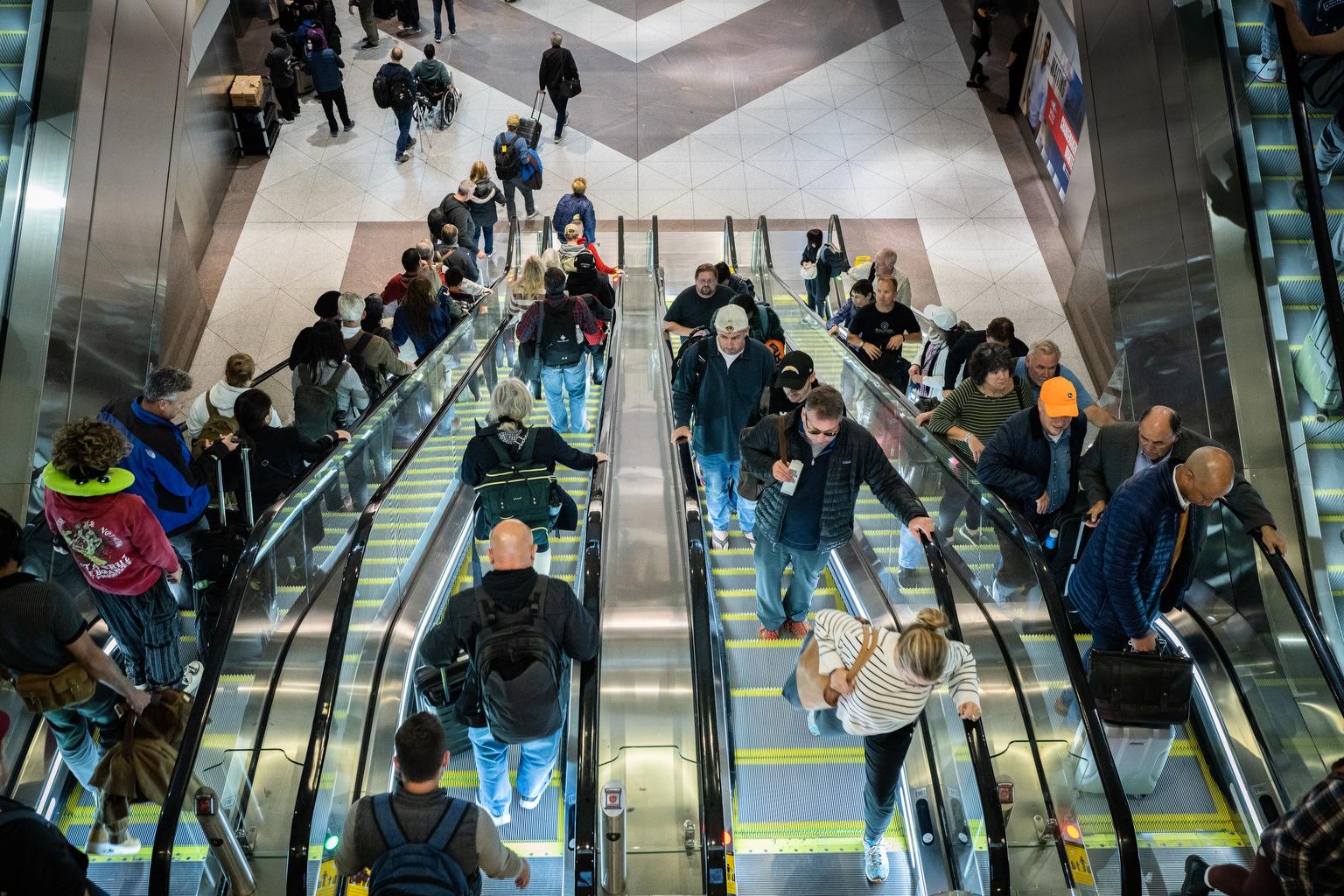
Flying into any Colorado airport right now can feel like flying into a construction zone. They were built for fewer passengers and older technology, and are trying to catch up.
The biggest one of all, Denver International Airport, known as DIA, was designed to serve 50 million passengers. This year it’s serving 78 million.
The result is that DIA can feel confusing and expansive — which it is. It’s the second-largest airport in the world by land size. Airport administrators estimate 40,000 people work there, giving it the feel of a small city.
Travelers this holiday season may also think back to the debacle with Southwest Airlines during Denver’s deep freeze in 2022.

To help Coloradans prepare, Colorado Matters interviewed with Phil Washington, including questions asked by CPR listeners.
He covers an update on an alternative to the shuttle between concourses, which occasionally breaks down and causes a backup after security. We also asked him about what DIA can do in light of an alarming national investigation that found planes have nearly collided at major U.S. airports.
Read the interview
This interview transcript has been edited for length and clarity.
Ryan Warner: Have security lines at DIA gotten longer?
Phil Washington: During times of the day, the lines are long. We are in conversations with the TSA (U.S. Transportation Security Administration), who we don't control, and we have been talking to them about our resource allocation for this airport. Ironically, we have fewer agents in 2023 than we had in 2019.
Editor’s note: CPR News asked TSA to confirm whether this is true, and why there are fewer agents now. A spokesperson declined to comment and deferred to Washington on the numbers.
Why would there be fewer TSA agents and more passengers?
Well, we're trying to find out. We had a great meeting with the TSA administrator. He came out here to Denver. If technology advances, then the idea from TSA is that that could facilitate fewer agents. The training of agents could be another factor that goes into the model that determines how many agents are here. We're looking at all of those things.
The layout of the airport is part of it. If you go to some airports, you might have seven terminals with seven separate security areas. That's the layout in places like Chicago and LAX (Los Angeles). We're different. We primarily have one terminal with right now two large security areas.
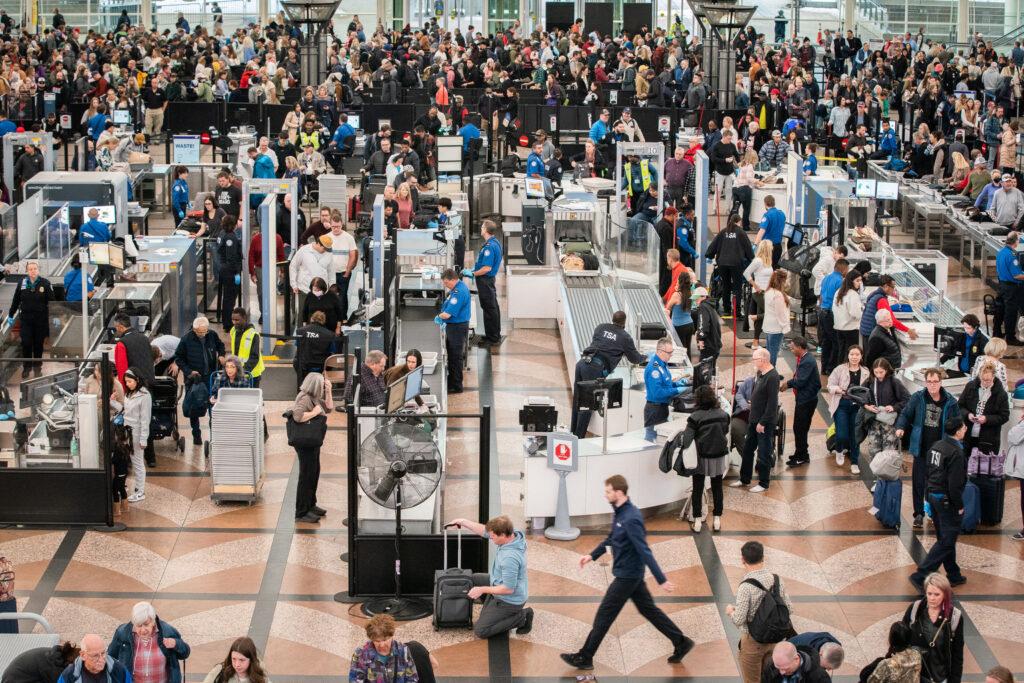
Are you lobbying for more TSA agents?
Absolutely.
Why couldn't Denver's airport look more like those other models?
The architecture and the design of this airport is unique. Building seven different security areas would be a daunting thing, but I will say there will be great improvement at the completion of our west security checkpoint that we're building now. We’ll open it up permanently in February 2024 with new equipment and 17 new checkpoints.
It will go from something like 150 people per lane per hour to something like 250 per lane per hour.
Will the experience of feeling like this is a construction zone get better anytime soon?
It's getting better already. The worst is behind us, and now I believe passengers will see a vast improvement when we open up that new checkpoint. Phase One was done ahead of schedule.
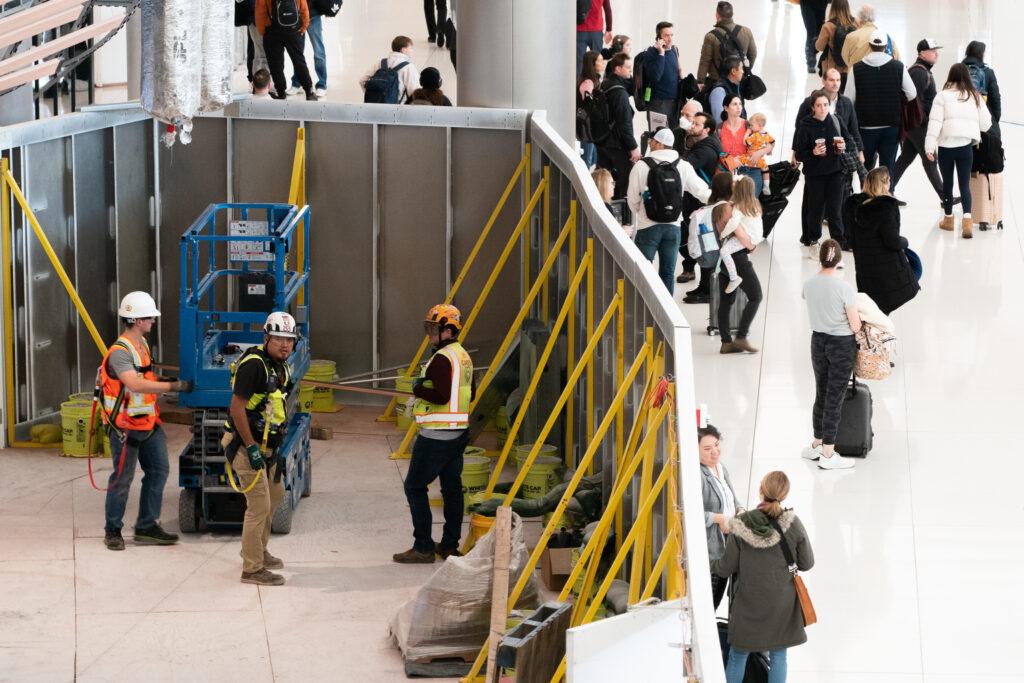
We got a question through Colorado Wonders from a listener named Matt Giaraffa in Golden. He asks, ‘Why is the airport so crowded?’ Can you put a finer point on it?
I think the first thing is people have prioritized travel. We are seeing numbers that are extraordinary. We are retrofitting this airport to fit probably 30 million more people than it was designed for.
It’s a mix — I would say about 60 percent of flights are originating and ending here, and 40 percent of flights are connections through Denver. So there are people coming and going, there are people connecting, and I think there are a lot of reasons. Denver is very, very popular, the Rocky Mountain region is too, and so that leads to an increase. Business travel has not come back completely from the pandemic, but we see that inching forward.
And Denver is geographically placed in the middle of the country, which makes it very, very attractive to airlines to fly and connect here in Denver.
Let's talk about the underground train between the terminal and concourses. You've asked for proposals for an alternative, a backup. What are the most promising alternatives you've seen?
First of all, the train is up and operating about 99 percent of the time, but when it goes down, it's complete chaos. We get that.
We asked for ideas. We received some extraordinary, innovative ideas, like pedestrian bridges from concourse A to B, concourse B to C. These are massive spans. Planes would have to go under them. They’d have to be long and high, with the possibility for concessions on those bridges. We're doing more detailed analysis, but these are costly.
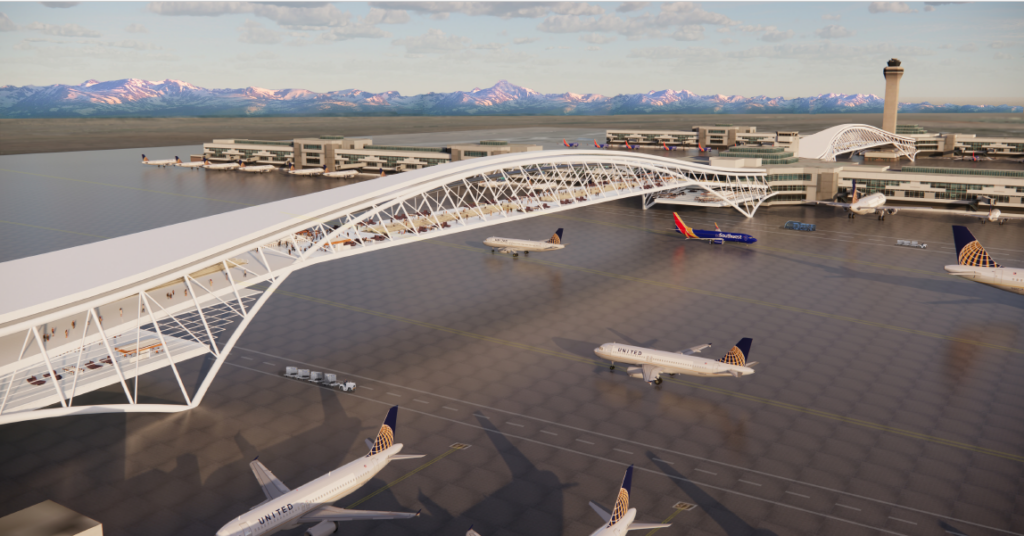
What about shuttles? Tunnels?
I don't think shuttles would help us. They don't quite have the capacity we need. I don’t think tunnels are viable. They’re too expensive. If you look at even rail projects right now and the cost of tunneling, and utility relocation, it makes it very, very expensive.
How would this affect people who have physical disabilities?
There would be moving walkways, and the trains would still be running as well.
Last Christmas, Southwest Airlines canceled 17,000 flights, many of them here in Denver. It ruined a lot of people's holidays. You’re not responsible for Southwest's operations, but what can the airport do to prevent something like that from happening with any airline you work with?
Yeah, it was an incredible disruption. I immediately asked for an after-action review with not just Southwest, but all of the airlines. We learned a lot. Communication was a big problem: the airlines never got word that we could help. The freeze and thaw cycles here in Colorado, which are very unique, were also a problem. We had pipes that froze with compressed natural gas. We had fuel facilities that were frozen over. Baggage handlers needed breaks because it was so cold, every five or 10 minutes. So we learned a lot.
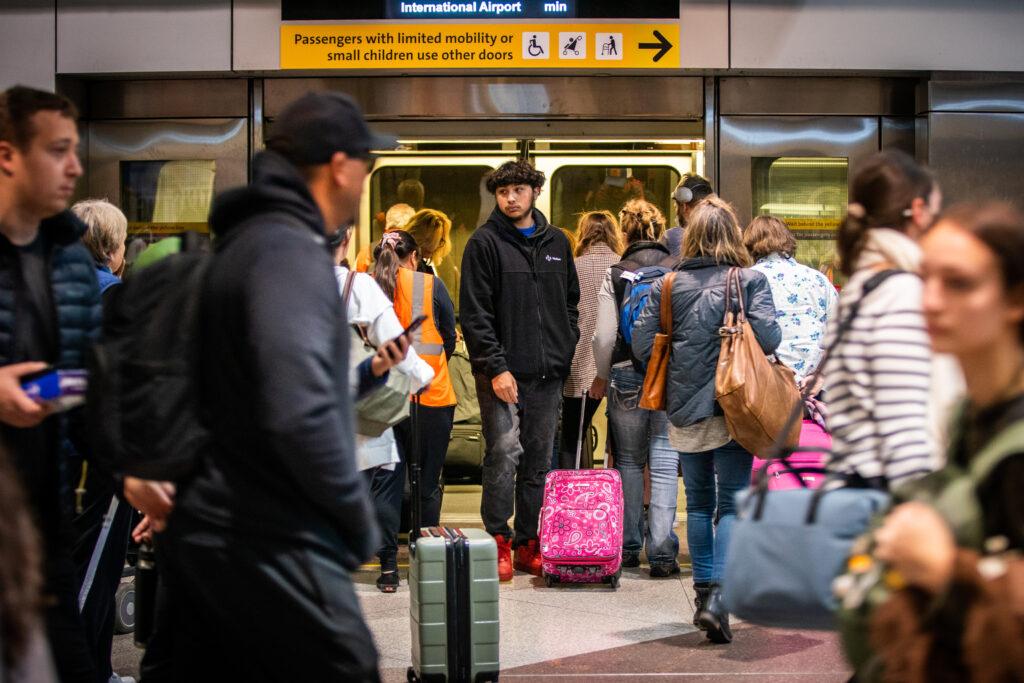
Are those fixed for this year?
I believe they are, yes. And the airlines sat down with us and we went over all those things. You can never say never, but we've got some things in place that will make it much smoother if we go through a cold cycle like that again.
You recently started offering a service, Sky Squad, where for $59 a person, there is help available to bring bags in from the car, find the security lanes and take people to the gate. It also gets people into an expedited security line. You've said this is intended to help people with disabilities, for example. But it made me wonder, is the airport becoming like another toll lane where the more you pay, the better your experience is?
No, I wouldn't say it is. I don't want to see us become that way. But there are some passengers that need extra attention and we want to provide that.
Editor’s note: Another service, called DEN Reserve, allows travelers to book a spot in the security line on the bridge to the A Concourse. Booking a scheduled spot is free, and travelers can use it up to a half hour before their scheduled time or a half hour after.
You've been involved with diversity, equity, and inclusion efforts here and in other roles, like when you were running the Los Angeles metro system. There are many documented incidents of racism on airplanes or in U.S. airports, from the way pat downs are done at security or how passengers are treated by airlines.
What are a couple of specific things you and your staff can do to make Denver's airport a more welcoming place for BIPOC passengers and employees?
We have an ecosystem out here. We communicate often. We talk to the 40,000 employees here all the time, and we deliver the same message, that we want people treated respectfully. I think you have to constantly state what your priorities are around equity, diversity, inclusion, and accessibility.
Signage has to be tied to that — signage that says we treat everybody with respect at this airport, and that you can call a number if you experience someone not respecting folks. The number is 720-730-IFLY. So we do our best to make sure that people feel like this is an accommodating place and we'll continue to do that.
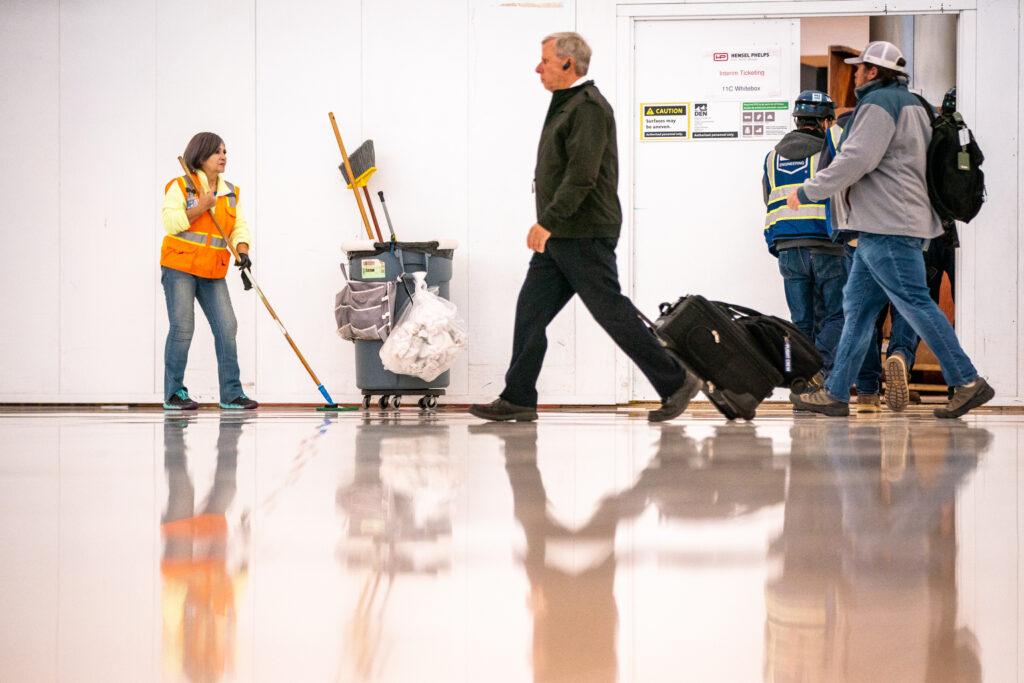
When you've gotten feedback on a line like that, or on your employee app, what’s something that's changed or improved as a result?
We have our sunflower program for people with disabilities. They can wear a sunflower that doesn’t bring attention to themselves, but still lets our volunteers see that a person might need help with a disability or accessibility or something like that.
Those sunflowers are available at any of the information booths that are in our concourses.
The New York Times has been doing a series on near collisions at airports around the country. Some of the incidents they cited were in Denver. This is an aspect of airline travel that most of us have not been worried about but maybe are now. The newspaper says a big reason planes are nearly colliding is human error, in part because of a shortage of air traffic controllers. The paper also cites a lack of adequate warning systems at some airports.
Do you know how many close calls are happening at DIA?
We have a low number compared to the rest of the country. I don't have the exact number for you. But one of the things that we just did was the ribbon cutting on a new taxiway. What's special about it is it allows pilots to use a quicker route to the runway, and to the terminal when they land, versus going all the way around the airfield.
So by using this large taxiway that we built, it allows them to cut across, and not have to do this whole run around as other planes are landing.
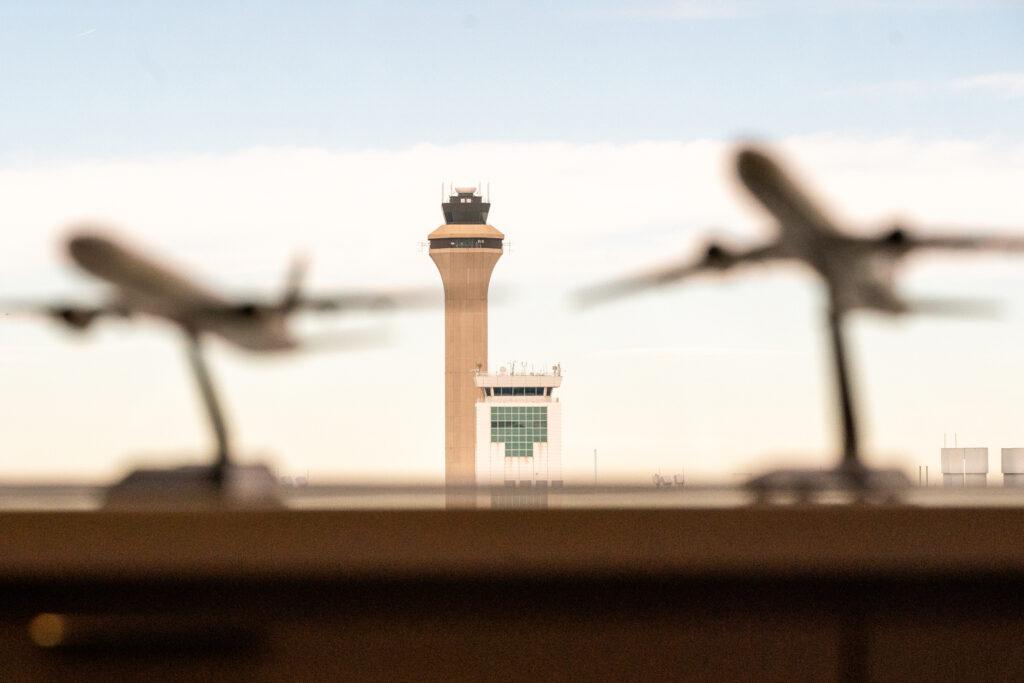
What about that notion of there just simply being shortages among controllers? Can a taxiway make up for that?
We have a shortage here, but our hope is that there'll be training classes starting up. I think the pandemic slowed some of that training down. And when a controller comes here, it might take them up to six to 12 months to be certified for this airport. And during that period, there is a supervisor that has to be in close proximity to that trainee, so that takes that supervisor away from their full-time duties as well.
Editor’s note: A spokesperson for Denver’s airport followed up via email to tell CPR News that: “The layout of our airfield is such that we do not have any intersecting runways. Additionally, the layout does not require airplanes to cross active runways during their taxi.”
You recently unveiled the vision for the future of the airport. In about 20 years, you plan to add new concourses, beyond A, B, and C. The new ones would be walkable from the security area and the terminal. How else do you expect the experience for travelers to be different in 2045 compared to now?
We have projections that say we will be at 120 million travelers going through this airport by that time — in an airport that was designed for 50 million. What that means is we need to start thinking about additional concourses. We have the ability to build 11 additional gates on the C concourse, and once we do that, we are tapped out with the existing concourses.
We will begin now to lay the foundation for additional ones that are walkable and do not require the shuttle train. They will be off the Great Hall, is what we're thinking.
It's my job to improve as best we can. This will be one of the greatest airports in the world when we're done.









